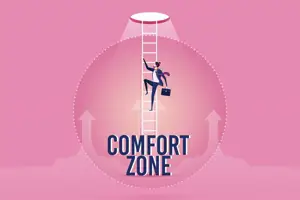What is the Comfort Zone? How to Step Out of Your Comfort Zone
Have you ever felt like you are living within a familiar framework, resisting change or challenges? Have you ever wondered what the comfort zone is and why it holds such great appeal?
Now, if you're ready to challenge yourself and step out of your comfort zone, let Aniday guide you in this article!
What is the Comfort Zone?

The Comfort Zone is a psychological state. Source: The Business Journals
According to Wikipedia's definition, the comfort zone is a psychological state in which a person feels comfortable, safe, and in control of their surroundings. It's a risk-free zone, free from stress or anxiety. When we are in the comfort zone, we can easily perform familiar tasks without the need to learn or exert much effort.
However, the comfort zone can also act as a barrier that hinders personal development, self-discovery, and a fulfilling life. While inside the comfort zone, we tend to shy away from new experiences, challenges, and adaptation.
The primary reason is that we often become overly reliant on established habits, beliefs, or values. We also miss out on opportunities to meet new people, explore new experiences, and create fresh values.
Why Don't We Dare Step Out of Our Comfort Zone?

There are numerous reasons why many of us hesitate to step out of our comfort zone. Some of the most common reasons include:
1. Fear of the Unknown
When confronted with new situations, people often worry because they:
- Don't know what the outcome will be, whether it's success or failure, happiness or sadness.
- Are averse to taking risks or experiencing losses. They want to preserve the status quo.
2. The Comfort of Safety
Being in the comfort zone provides a sense of safety and familiarity because:
- You know what you're doing and have control over the situation.
- You don't have to contend with pressure, difficulty, or challenges.
- You can avoid opinions, feedback, or criticism from others.
- You feel confident and satisfied with yourself.
Is Stepping Out of Your Comfort Zone Necessary?
Alt: A person stuck in a box
Caption: The Comfort Zone offers many benefits. Source: Entrepreneur
The answer is yes. Stepping out of your comfort zone can yield numerous benefits, such as:
- Enhanced Adaptability and Problem-Solving: Confronting new situations can help individuals become more creative, flexible, and knowledgeable.
- Improved Quality of Life: The desire to break free from the comfort zone opens doors to new, interesting, and meaningful experiences.
- Personal Development and Goal Achievement: Stepping out of the comfort zone allows for exploration and the development of one's potential. It sets the stage for higher goals, self-improvement, and the reinforcement of strengths.
How to Step Out of the Comfort Zone?

7 ways to step out of your comfort zone. Source: Entrepreneur
Stepping out of your comfort zone is not an easy task; it requires determination, perseverance, and courage. Here are some ways to begin the journey:
Start Small
You don't need to undertake monumental tasks to leave your comfort zone. Small changes in your daily life can make a significant difference. Examples include altering your schedule, location, or daily activities, trying new foods, engaging with strangers, or joining a new class or club.
Learn New Skills
Embrace learning as a way to challenge your comfort zone. Acquire new skills, whether they are related to your job or personal interests. Take online courses, seek guidance from experts, and expand your knowledge.
Cultivate Creativity
Train your mind by exposing yourself to various forms of art, media, and intellectual exercises. Create an environment that encourages creative expression, experimentation, and learning from mistakes.
Challenge Yourself
Face your fears and self-doubt by taking on tasks you've never attempted before. Consider public speaking courses, solo travel, or joining new clubs or events. These experiences help build confidence and self-esteem.
Honesty
Be honest with yourself and others. Understand your desires, capabilities, strengths, and weaknesses. Set clear, measurable goals, and track your progress.
Set Goals
Define your objectives and work toward them. Establish SMART goals (Specific, Measurable, Achievable, Relevant, Time-bound) to track and evaluate your progress.
Move to the Growth Zone
Be willing to enter the stretch zone, a psychological state filled with excitement, challenge, and self-improvement. Choose activities aligned with your strengths, interests, and goals, and seek support from friends, family, or experienced mentors.
Conclusion
In conclusion, the concept of the "comfort zone" is more than just a psychological state; it's a pivotal factor in personal growth and self-discovery. Understanding what the comfort zone is and why we often hesitate to step out of it is the first step towards transformative change.
As we've explored in this article, the comfort zone can both provide a sense of security and act as a barrier to progress. However, the benefits of stepping out of your comfort zone, such as enhanced adaptability, improved quality of life, and personal development, are undeniable.
So, if you're ready to challenge yourself and embark on a journey of self-improvement, remember that leaving your comfort zone is the key. The comfort zone is where you are now, but it's not where you need to stay. By taking small steps, setting clear goals, and embracing the growth zone, you can break free from the constraints of your comfort zone and embrace new opportunities, experiences, and personal development.
We hope this article from Aniday has provided you with valuable insights and practical steps to help you venture beyond your comfort zone.
Reference
Aniday's HR Services
Headhunting Service
Find and recruit quality candidates in just 1 week! Supported by 40,000 experienced headhunters in IT, Finance, Marketing… capable of recruiting in any region.
Headhunting Service ➔Employer of Record (EOR) Service
On behalf of your business, we recruit employees and handle payroll without the need to establish a company in markets such as Vietnam, Singapore, Malaysia, India, Indonesia…
Employer of Record (EOR) Service ➔